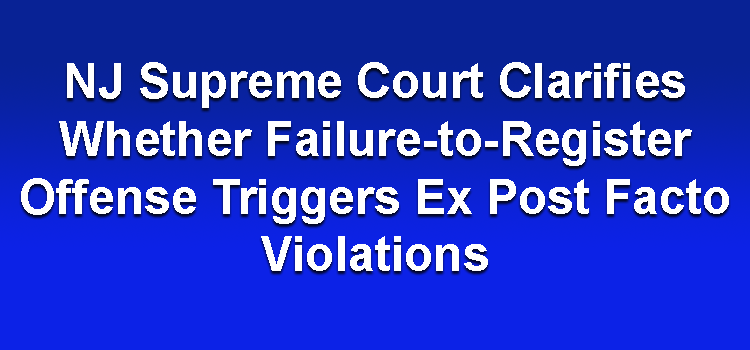
The Supreme Court of New Jersey recently clarified whether state or federal constitutional ex post facto prohibitions permit defendants to be convicted of failure to comply with sex offender registration requirements when each defendant’s registration requirement arose from a conviction that occurred before the penalty for noncompliance was raised a degree. In State v. Hakum Brown and State v. Rodney Brown (A-39-19/083353) (Decided January 25, 2021), the court held that the New Jersey Legislature can increase the penalty for the offense of failure to comply with the regulatory registration requirement — which is separate and apart from defendants’ predicate sex offenses —without violating ex post facto principles as to those predicate offenses.
Facts of State v. Hakum Brown; State v. Rodney Brown
New Jersey’s law governing the sex offender registration and notification system, N.J.S.A. 2C:7-1 to -23 or more commonly known as Megan’s Law, imposes a registration requirement on convicted sex offenders. In its original form, Megan’s Law made failure to register chargeable as a fourth-degree offense. The statutory scheme has been amended several times, including a 2007 amendment through which the New Jersey Legislature prospectively elevated failure to register to a third-degree offense.
In 1995, Rodney Brown (R.B.) was convicted of sexual assault. In 2000, Hakum Brown (H.B.) was convicted of sexual assault and endangering the welfare of a child. As a result of those predicate convictions, H.B. and R.B. were subject to the sex offender registration requirements imposed by Megan’s Law. At the time of H.B.’s and R.B.’s sex-offender convictions, failure to comply with the registration requirements was punishable as a fourth-degree offense. However, in 2007, the Legislature upgraded failure to register to a third-degree offense. In 2014, H.B. failed to timely register with his local police department. R.B. similarly failed to register in 2015. Each was charged with third-degree failure to register.
H.B. pleaded guilty but appealed, asserting there is an ex post facto violation in being charged with third-degree failure to register when, at the time of his predicate sex- offender conviction, failure to register was only a fourth-degree offense. R.B. pleaded not guilty. He moved to dismiss his indictments on ex post facto grounds, and the trial court granted R.B.’s motion in its entirety. The State appealed the dismissal of R.B.’s indictments. The Appellate Division consolidated the State’s appeal in R.B.’s matter with H.B.’s appeal from his conviction. Relying on State v. Timmendequas, 460 N.J. Super. 346 (App. Div. 2019), the Appellate Division reversed H.B.’s conviction and affirmed the dismissal of R.B.’s indictment.
NJ Supreme Court’s Decision in State v. Hakum Brown; State v. Rodney Brown
The New Jersey Supreme Court reversed. It held that the defendants suffered no ex post facto violation as a result of being charged with failure-to-register offenses bearing the increased degree.
“We hold that defendants suffered no ex post facto violation as a result of being charged with failure-to-register offenses bearing the increased degree. Defendants committed the charged offenses after the effective date of the 2007 amendments, of which each had fair notice,” Justice Jaynee LaVecchia wrote. “This Court has consistently regarded the Megan’s Law registration requirement as a legislatively imposed regulatory consequence of committing a sex offense, as defined under Megan’s Law, even though the Legislature has chosen to enforce that administrative scheme with punitive consequences.”
As the court explained, two findings must be made for a law to violate the constitutional prohibition on ex post facto laws. The court must determine: 1. whether the law is retrospective, meaning it applies to events occurring before its enactment or changes the legal consequences of acts completed before its effective date; 2. whether the law, as retrospectively applied, imposes additional punishment to an already completed crime.
In reaching its decision, the New Jersey Supreme Court emphasized that it previously held in Doe v. Poritz, 142 N.J. 1 (1995),that the Megan’s Law registration requirement is regulatory and remedial rather than punitive and therefore held that Megan’s Law’s retroactive application to persons who had already been convicted of eligible sex offenses did not subject past offenders to additional punishment and did not offend the Ex Post Facto Clauses. As the court further explained, registration is retroactive but not punitive. Prosecution for failing to register, however, is different in that it addresses a separate crime and is punitive but not retroactive. Based on the foregoing, the New Jersey Supreme Court further held that “the Legislature is free to increase the penalty for the offense of failure to comply with the regulatory registration requirement — which is separate and apart from defendants’ predicate sex offenses — without violating ex post facto principles as to those predicate offenses.”
